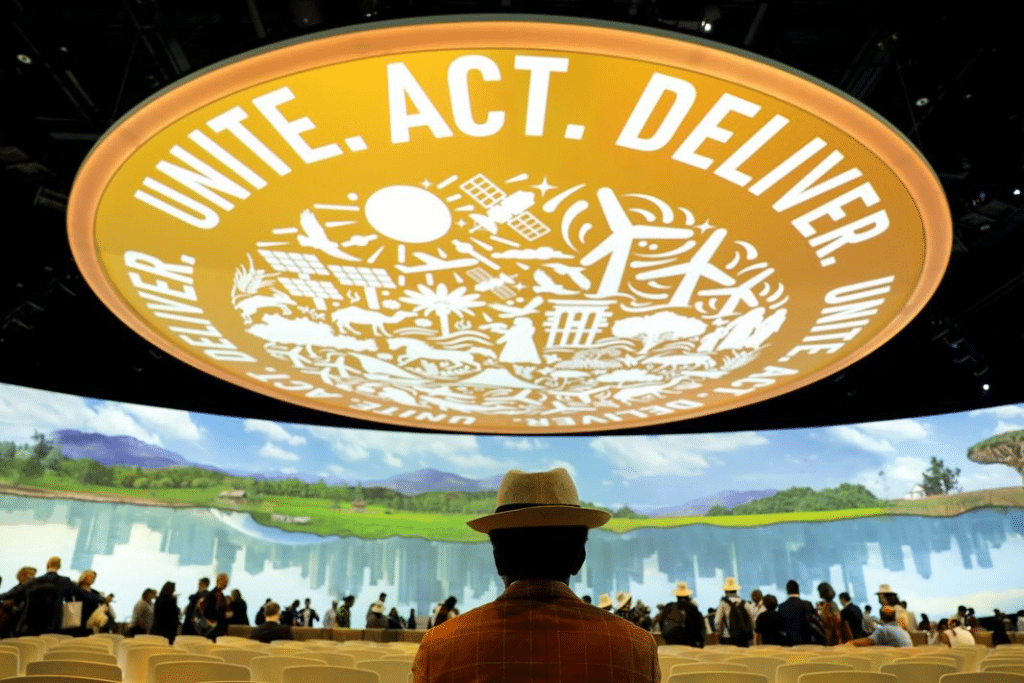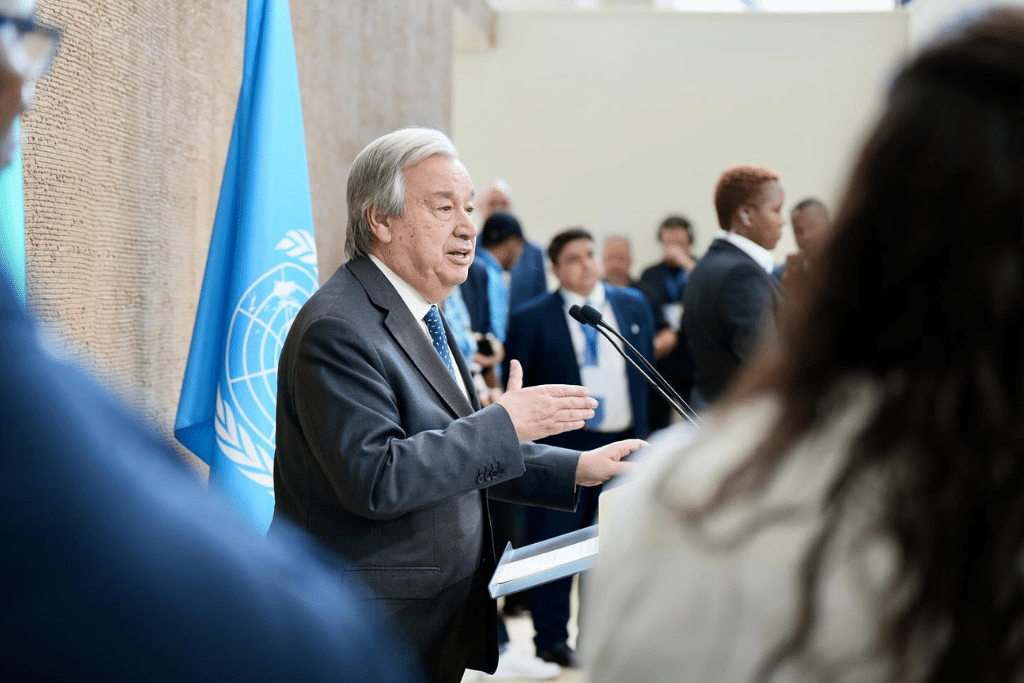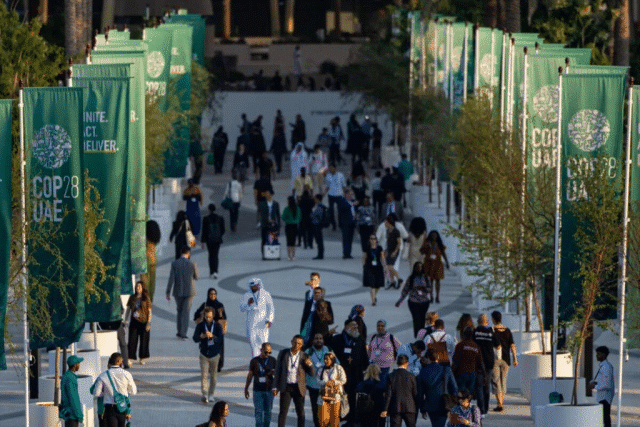COP28 in Dubai
Nonetheless, most attendees jetted to the event in private or government-owned jets. Guterres emphasised that three things matter most to save the planet: reducing greenhouse gas emissions, replacing fossil fuels with more sustainable energy sources and speeding up the process of sustainable energy transformation.
Numerous global leaders flocked to Dubai with private jets to demonstrate their noble aspirations for creating a better world. Not least, Charles III, a vociferous advocate of sustainable transformation and the King of the United Kingdom jetted to Dubai before giving a moral speech about balance, harmony and similar frivolities. The Slovenian President, Nataša Pirc Musar, jetted to Dubai, too. Joe Biden, the head of the US, a country that has long been one of the greatest global polluters, did not bother to attend the event and instead decided illuminating the humungous Christmas tree in front of the White House took precedence over debates about the climate crisis. John Kerry led the American delegation.
Politicians should be examples for others, yet they are polar opposites. That is why we asked our followers on LinkedIn how they believe global decision-makers should have arrived at the event. Although we are not trivialising the importance of such summits, we are convinced politicians could do far more to reduce their carbon footprint. Given the average carbon footprint of an EU citizen amounts to 8.2 tonnes, while a private jet generates 2 tonnes of carbon footprint per hour, the answer seems as clear as day. Scientific studies have, moreover, shown private jets generate up to a hundred times more greenhouse gases than commercial flights.

Here are the results:
- 38% – Business/First Class – commercial airlines
- 34% – Economy Class – commercial airlines
- 19% – Low-cost airlines
- 9% – Private jets
Our readers would thus advise politicians to go from words to actions and change how they arrive at the event. Science is brutal and has pointed out that we must reduce burning fossil fuels by 50% if we want to limit global warming to 1.5 degrees Celsius by 2050.
This approach illustrates a part of the reason why this year’s COP in Dubai was a complete and utter failure. Today, COP28 ended in a great defeat regardless of the eloquent rhetorical skills of politicians. Fossil fuel lobbyists snatched the event and achieved the eagerly-awaited final summit statement was a dead letter before it was signed or finished. This year, an astounding 2456 fossil fuel lobbyists attended, joined by 475 lobbyists for carbon capture and storage. Media revelations about under-the-table deals headed by oil moguls, organised by the oil sultan and President of COP28, Ahmed Al Jaber, are even more concerning than flying by private jets. The stark reality is that COP28 produced no agreement, which means the goal remains unfulfilled. What concerns us most is that key stakeholders did not discuss anything concrete about the future of fossil fuels. The European Union strives to phase down on fossil fuels, gradually reducing the demand for fossil fuels. Almost every EU country supports the initiative, including Slovenia. Still, nowhere was the term heard at COP28, seemingly blurred from the draft of the summit statement as soon as the controversial event commenced. Over 100 countries aspired to make a deal to reduce fossil fuels. On the other hand, the big-time oil producers in OPEC, spearheaded by India and Saudi Arabia, vociferously opposed it. That decision starts to make sense upon reading the title of Mr. Al Jaber, the head of the Abu Dhabi National Oil Company. To ridicule COP28, he organised the Arab Energy Summit in Qatar concurrently with the event that should have changed climate policies. A travesty.
All of the above made me think about the ethical dilemmas event organisers must face. We will have to ask ourselves when to turn down a client and their project more often in the future. This year’s COP28 seems like a perfect fossil fuel lobby event spin, undermining all aspirations of environmentalists and countries that aim to achieve sustainable transformation. When the organisers boast about the incredible efforts and success of the event in the upcoming days, ask yourself why the event took place in Dubai. Why was not Jamaica selected to host the event, a country with the best Overshoot Day on the planet? Why does this event fit so well into the calendar of mega-events hosted by Dubai? Ultimately, we must ask ourselves what the carbon footprint of COP28 was. We hope the organisers measured it and will publish transparent data about it.

The show goes on in Baku
To no avail, UN Secretary-General Antonio Guterres urged the world to “end the fossil fuel era”. The age of miracles is past, and Dubai is no surprise! The show goes on in Baku.
FOOD FOR THOUGHT TO REFRESH YOUR MEMORY
Findings from The Carbon Inequality Era (2020) report conducted by Oxfam and Stockholm Environment Institute:
- In 2019, 1% of the most affluent people in the world generated 16% of global carbon emissions, equal to 66% of the poorest people in the world (5 billion people).
- Since 1990, the richest 1% have generated twice as much carbon footprint as the poorest half of the planet combined.
- Carbon emissions of the richest 1% will be 22 times above the tipping point by 2030 (tipping point = amount of emissions that still enables us to limit global warming by 1.5 degrees Celsius).
- Yearly emissions of the richest 1% on the planet cancel out carbon savings created by nearly a million wind electric plants.
Find out more about the findings at https://www.sei.org/publications/the-carbon-inequality-era/.














